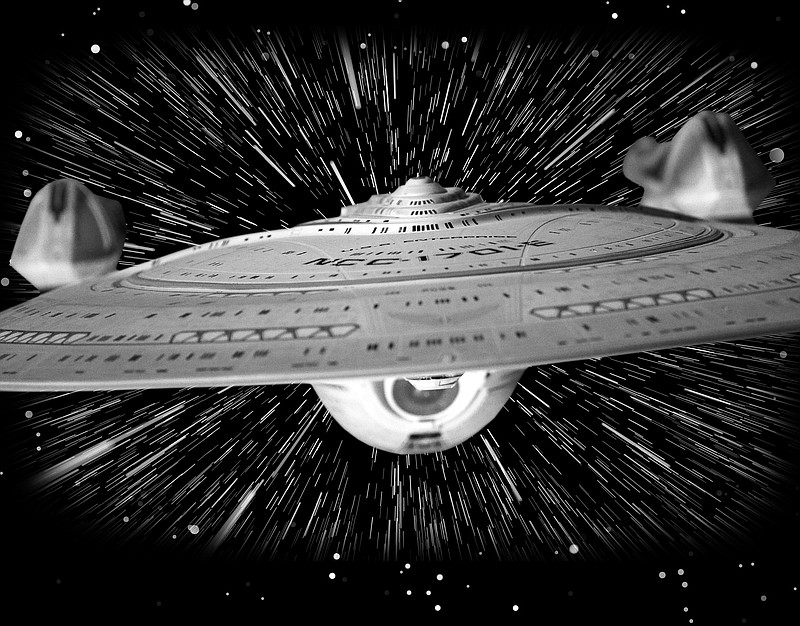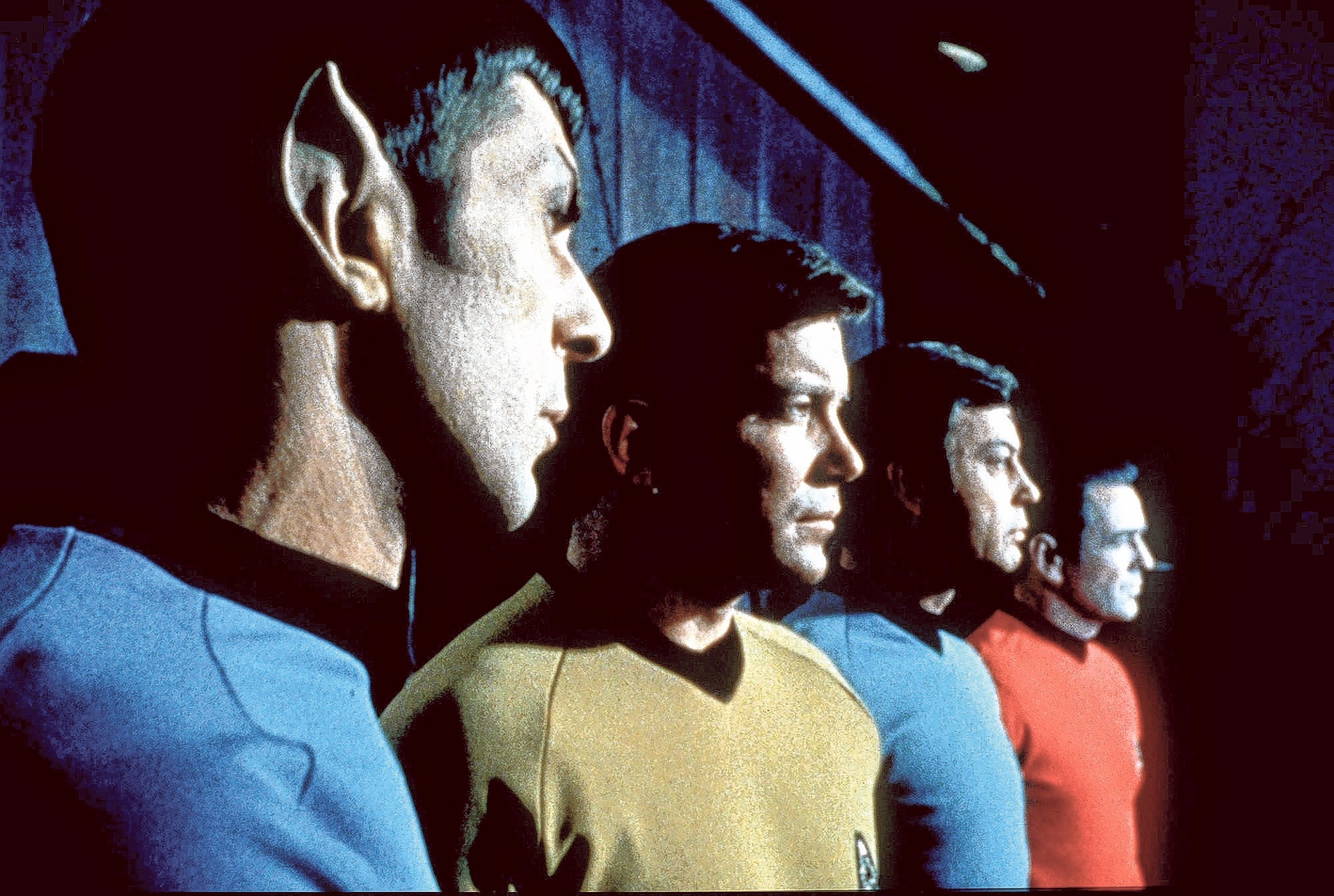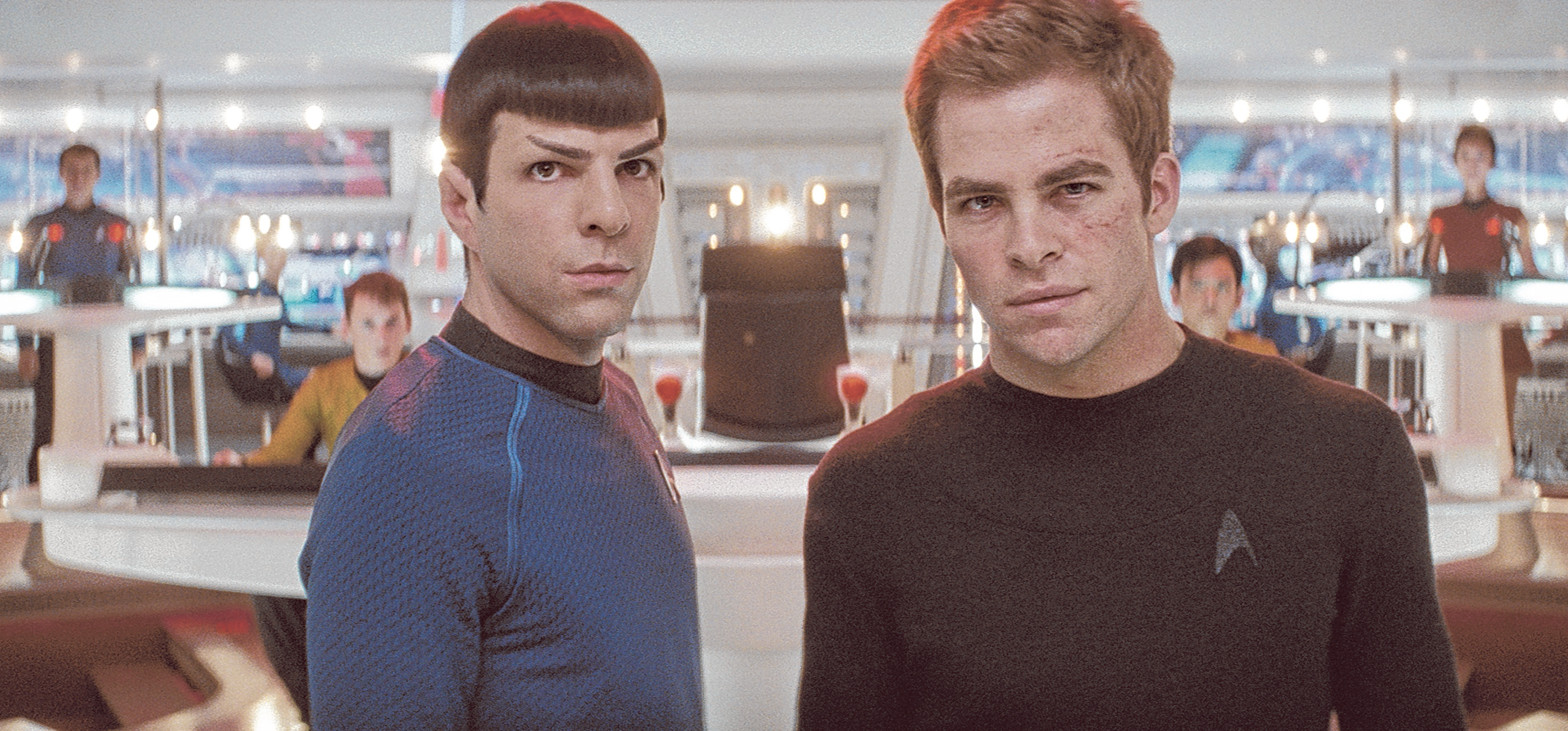I'm a huge "Star Trek" geek, and I wouldn't take offense to being called a Trekkie. I'm diverse in my geekdom, but 'Trek' was my gateway drug.
Timeline
› 1964 — Gene Roddenberry drafts a pitch for “Star Trek,” focusing on the exploits of a Capt. Robert April in command of the starship S.S. Yorktown› 1966-1969 — “Star Trek” the original TV series airs on NBC› 1968 — Publication of “Mission to Horatius,” the first original “Star Trek” novel› 1973-1974 — “Star Trek” the animated series airs on NBC› Dec. 7, 1979 — “Star Trek: The Motion Picture” released› June 4, 1982 — “Star Trek II: The Wrath of Khan” released› June 1, 1984 — “Star Trek III: The Search for Spock” released› Nov. 26, 1986 — “Star Trek IV: The Voyage Home” released› 1987-1994 — “Star Trek: The Next Generation” airs in first-run syndication› June 9, 1989 — “Star Trek V: The Final Frontier” released› Dec. 6, 1991 — “Star Trek VI: The Undiscovered Country” released› 1993-1999 — “Star Trek: Deep Space Nine” airs in first-run syndication› Nov. 18, 1994 — “Star Trek: Generations” released› 1995-2001 — “Star Trek: Voyager” airs on UPN› Nov. 22, 1996 — “Star Trek: First Contact” released› Dec. 11, 1998 — “Star Trek: Insurrection” released› 2001-2005 — “Star Trek: Enterprise” airs on UPN› Dec. 13, 2002 — “Star Trek: Nemesis” released› May 8, 2009 — “Star Trek” reboot directed by J.J. Abrams› May 16, 2013 — “Star Trek: Into Darkness” released› July 22, 2016 — “Star Trek: Beyond” released› 2017 — “Star Trek: Discovery” set to air on CBS
Did you know?
› In 2011, NBC’s decision to cancel the original series of “Star Trek” after three seasons (and despite a letter-writing campaign from fans) was ranked No. 4 on TV Guide Network’s “25 Biggest TV Blunders 2.”› According to “Star Trek” lore, humanity masters faster-than-light travel and encounters its first extraterrestrial species, the Vulcans, on April 5, 2063. First contact occurs in Bozeman, Mont.› “Star Trek” creator Gene Roddenberry’s wife, Majel Barrett, who played Nurse Chapel in the original series, also provided the voice of the ship’s computers in every series and movies from the 1966 original through J.J. Abrams’ 2009 reboot.› During the 1968 Hugo Awards, all five nominees for the Best Dramatic Presentation were episodes of “Star Trek.”› Gene Roddenberry’s original pitch for “Star Trek” describes Spock as being “almost frightening — a face so heavy-lidded and satanic you might almost expect him to have a forked tail.” Also, “probably half Martian.”
Medals of honor
› Academy Awards — 15 nominations, one win in 2010 for “Star Trek” reboot (Best Makeup)› Emmy Awards — 155 nominations, 34 wins› Golden Globes — One nomination› George Foster Peabody Awards — One win for the 1987 “Star Trek: The Next Generation” episode “The Big Goodbye”› Grammy Awards — One nomination› American Society of Composers, Authors and Publishers Awards — Seven nominations, seven wins
Kirk speaks
William Shatner discusses his Star Trek life.
To kick off his pitch for a little science fiction TV show called "Star Trek," Gene Roddenberry offered up an astronomy lesson.
In the observable universe, Roddenberry wrote in 1964, there are about 400 billion galaxies, comprising more than 7 decillion stars (10 with 33 zeroes following it). Even if only one in 1 billion stars had planets and only one in 1 billion planets were of similar size and composition to Earth, the potential for intelligent alien life would still be immense, he explained.
So what would happen if mankind were to travel to the stars and, in so doing, come into contact with these lifeforms? What adventures would we have, he asked.
The narrative potential of mankind exploring a limitless crop of inhabited worlds "similar to our own" - Roddenberry dubbed this "the parallel worlds concept" - was quite literally astronomical, he argued. And what better setting for a show?
"'Star Trek' offers an almost infinite number of exciting science fiction stories, thoroughly practical for television," he concluded in the pitch. "There will be differences, of course, ranging from the subtle to the boldly dramatic, out of which comes much of our color and excitement."
Two years after writing those words, Roddenberry's show was green lit by NBC, which aired the first episode, "The Man Trap," on Sept. 8, 1966, making Thursday the franchise's 50th anniversary.
"There's quite a bit of suspense and tricks with gadgets that will please the sci-fi buffs no end," wrote Hollywood Reporter's Bill Ornstein in a 1966 review of the first episode. "Should be a winner."
Where no show had gone before
On the eve of its golden anniversary, the Star Trek franchise has long since transcended the bounds of the small screen. It now stands as a science fiction touchstone, one whose multi-billion-dollar sprawl encompasses five TV series, more than a dozen movies, hundreds of novels and comics and a fan base widely considered to be one of the most rabid in all of pop culture.
Chattanoogan Mark Compton is one of them.
"I'm a huge Star Trek geek, and I wouldn't take offense to being called a Trekkie," he says. "I'm diverse in my geekdom, but Trek was my gateway drug."
Compton, 42, remembers falling in love with the franchise during an early scene in 1979's "Star Trek: The Motion Picture" when Capt. James T. Kirk (William Shatner) receives a tour of the U.S.S. Enterprise from his chief engineer Montgomery Scott (James Doohan).
"It sent chills down my spine... I loved how the ship looked," he recalls. "My mom was like, 'Oh, that was a show that was on when I was a kid.' She introduced me to the... reruns, and that was it."
Like many Star Trek fans, whether hardcore Trekkies or the more casually adoring, Compton says he appreciated the fact that, unlike many science fiction properties, Roddenberry's universe offered an optimistic view of the future.
Instead of clashing constantly with other races, the men and women - and aliens - serving in the ranks of Starfleet were predominantly engaged in science, diplomacy and, above all, exploration. They wouldn't run from a fight (usually), but they didn't seek them out, either. More often than not, their orders were to set their phasers to stun, not to kill.
That, Compton says, was an admirable departure from the sci-fi norm, and it stands in stark contrast to much of the pessimism and anti-hero worship of modern TV.
"It's good to have at least that much of an optimistic view of the future to suggest that, 'Maybe it'll get better. Maybe we'll figure this crap out,'" he laughs.
The future present
Despite its futuristic setting, Star Trek stories have consistently reflected, and occasionally challenged, 20th- and 21st-century social norms.
"They picked up and drew upon, through science-fiction tropes, all that was happening in their world at that time," says Dr. Daniel Bernardi, a 52-year-old professor of cinema at San Francisco State University who has watched Star Trek since his childhood.
"That's the beauty of science fiction," he adds. "It's more about the present than almost any other genre, despite having to do with aliens and the future."
When "Star Trek" premiered, the civil rights movement and the Cold War with communism were generating tremendous racial tension and political unease in America. In contradiction to the prevailing attitudes of the day, fans say they appreciated that the series took a deliberately inclusive tack by filling the bridge of the Enterprise with a multicultural crew that included a black communications officer, Nyota Uhura (Nichelle Nichols), an Asian helmsman, Hikaru Sulu (George Takei), and a Russian navigator, Pavel Chekov (Walter Koenig).
"'Star Trek' is, to me, a symbol of that future where we aspire to be color blind," Bernardi says.
In his 1998 book, "Star Trek and History: Race-ing toward a White Future," Bernardi argues that the show often "advanced a white liberal agenda" by promoting the cause of assimilation at the cost of cultural identity. Even though it "participated in the 'isms' of its times," he suggests, the show often found ways to subtly push back against prevailing social norms, such as emphasizing non-violence in contrast to the imagery of the Vietnam War, which was appearing on nightly news broadcasts.
"There were these moments of resistance I could hold onto to give me hope," Bernardi says. "I still think 'Star Trek' was a problematic text, but at least it tried to make a difference. In many ways, subtly, it did, unlike a lot of TV."
New series, new angles
In its decades-long, on-again-off-again tenure on the small screen, the Star Trek franchise has explored many eras and locations within Roddenberry's universe.
Despite its contemporary popularity, the original series of "Star Trek" only lasted three seasons before being cancelled by NBC in 1969. Except for an animated follow-up that ran from 1973 to 1974, the series wouldn't return to TV until "Star Trek: The Next Generation" began its seven-season run in 1987. The show featured a new crew, lead by Patrick Stewart as Capt. Jean-Luc Picard, and was set decades after the adventures of Capt. Kirk and company.
"Star Trek: Deep Space Nine," the follow-up to "The Next Generation," dramatically altered the franchise's storytelling format. Instead of one crew's adventurous mishaps aboard an ever-moving starship, "DS9" focused on the occupants of an isolated space station and a troubled Starfleet captain's attempts to keep the peace between two species that only recently ended a brutal conflict.
"I think 'Deep Space Nine' is the most socially conscious and complex of all the iterations of Star Trek, and it will go down, in time, as the second best series after the original series," Bernardi says. "When it comes to race and xenophobia and geopolitical stress, that is the series that is the most effective."
Chattanoogan Carl Cadwell says that, along with "Star Trek II: The Wrath of Khan," "Deep Space Nine" represents one of the best examples of the franchise's willingness to experiment and radically alter its own traditions.
"The conflict wasn't just about good versus evil," the 33-year-old says. "It's about getting trapped in between power structures and your own mistakes in your own life.
"It wasn't like in 'The Next Generation,' where they were zipping around solving people's problems.... On the fringes, where 'Deep Space Nine' is, [the Federation are] encountering this power that they cannot defeat."
Despite his love of "Deep Space Nine," Cadwell says he appreciates aspects of all five Star Trek series, which also include "Star Trek: Voyager" (1995-2001) and "Star Trek: Enterprise" (2001-2005). Given his own mixed-race heritage and adoption as a child, Cadwell says he especially appreciates the complexities of the character Worf, a Klingon raised by human parents who appears in both "The Next Generation" and "Deep Space Nine."
"Being out of your culture and dealing with that, that was a character who represented a part of me that I hadn't seen dealt with on TV before," he says.
As far as the original [Star Trek series], … you can tell its obviously dated, but the stories are still good. The fact that they keep making new ones and making it fresh and new, that's part of the appeal to the whole Star Trek phenomenon.
'Beyond' and beyond
It has been more than a decade since Star Trek last appeared on TV following the 2005 cancellation of "Enterprise," a prequel to the original series and, at four seasons, the shortest live-action Star Trek series since the original.
"I always felt that whoever came up with the term 'franchise fatigue' was right, that there was definitely some of that," the show's producer, Rick Berman, told sci-fi/pop culture website Blastr in a 2012 interview.
"There was just too much going on at the same time," he adds. "By then,... 'Voyager' was still on the air, a third ['The Next Generation'] movie was coming out, and there was definitely a feeling that maybe we were pushing it, [that] 'Oh, my God, here comes another Star Trek show.'"
Despite its absence from the small screen, the franchise has seen great success at the box office thanks to director J.J. Abrams' well-received 2009 reboot of the franchise and its two sequels, the latest of which, "Star Trek: Beyond," released on July 22. Combined, the Abrams Era trilogy has grossed $1.1 billion worldwide at the box office, more than the 10 preceding films combined.
Next January will mark Star Trek's return to the small screen with the CBS series "Star Trek: Discovery," which is set a century after "Enterprise" and a decade before the events of the original series.
In keeping with Star Trek's tradition of inclusivity, the show promises to feature a diverse cast, including an unnamed female lead and a character who showrunner Bryan Fuller described as openly gay in interviews during a 2016 summer press tour.
With its films performing so well and the promise of a much-anticipated return to the small screen, fans say Star Trek promises to continue living up to Roddenberry's initial pitch to "explor[e] an anthology-like range of exciting human experience."
"I think it's the most significant TV series in history," Bernardi says. "Will we still be talking about it in 25 years? Absolutely."
Contact Casey Phillips at cphillips@timesfreepress.com or 423-757-6205. Follow him on Twitter at @PhillipsCTFP.


